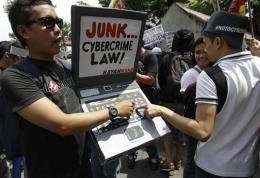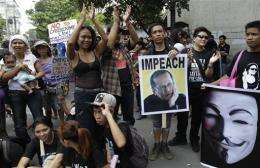Philippine Supreme Court suspends cybercrime law

(AP)—The Philippine Supreme Court on Tuesday suspended implementation of the country's anti-cybercrime law while it decides whether certain provisions violate civil liberties.
Justice Secretary Leila de Lima said the court issued a temporary restraining order stopping the government from enforcing the law signed by President Benigno Aquino III last month. The law took effect last week but there has been no report of anyone being charged with violating it.
The law aims to combat Internet crimes such as hacking, identity theft, spamming, cybersex and online child pornography.
Journalists and rights groups oppose the law because it also makes online libel a crime, with double the normal penalty, and because it blocks access to websites deemed to violate the law. They fear such provisions will be used by politicians to silence critics, and say the law also violates freedom of expression and due process.
Brad Adams, Asia director for Human Rights Watch, commended the court and urged it to "go further by striking down this seriously flawed law."
In one of the 15 petitions filed with the court questioning the law's constitutionality, the National Union of Journalists of the Philippines said it would "set back decades of struggle against the darkness of 'constitutional dictatorship' and replace it with 'cyber authoritarianism.'"

Many Facebook and Twitter users and the portals of media organizations in the Philippines have replaced their profile pictures with black screens to protest the law. Hackers also defaced several government websites in protest.
Renato Reyes, secretary general of the left-wing New Patriotic Alliance, another petitioner, said the court's order was "a major victory for freedom and civil liberties."
Aquino has supported the online libel provision, saying people should be held responsible for their statements. But he has also said he is open to lowering the penalties.
Several legislators, including some who approved the law, have said they will try to amend the law to address civil-rights concerns.
Copyright 2012 The Associated Press. All rights reserved. This material may not be published, broadcast, rewritten or redistributed.




















